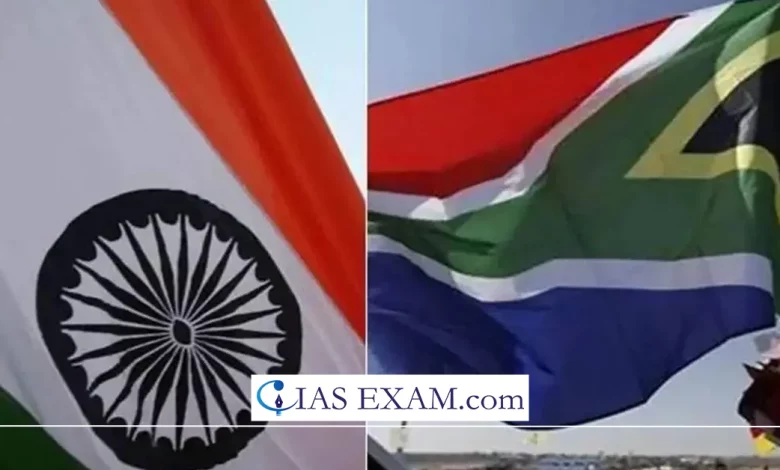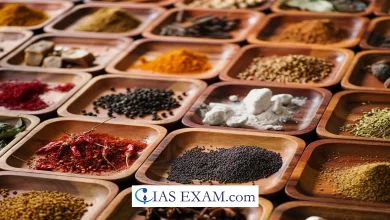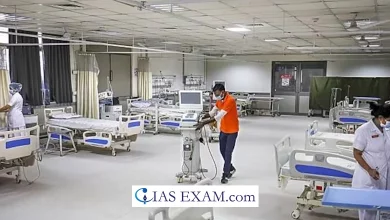Significance of Africa for India in its Global South Vision
GS Paper 2 - International Relations

Context
India’s relation with the African nations is very crucial with respect to its ‘Global South Vision’ particularly at a time when it seeks to navigate a changing global landscape.
While India works towards institutionalizing the concept of the Global South, differing views exist regarding its effectiveness. Some view it as a force for change, advocating for a more inclusive global governance structure. Others critique it for oversimplifying a complex world order. Despite that, the term’s utility in the transition to multipolarity cannot be ignored.
About India’S Global South Vision
- India’s Global South Vision focuses on developing strategic ties with Southern Hemisphere countries in order to create a more equal and inclusive global order.
- It emphasizes economic cooperation, multilateralism, and solidarity among developing nations in order to overcome shared difficulties and foster long-term development.
- India and Africa boast immense economic potential, with Indian investments exceeding $98 billion in 2023 and bilateral trade totalling $100 billion.
- Africa’s presence in global forums is pivotal for India’s vision of rule-based global governance, as demonstrated by India’s advocacy for the African Union in the G20 summit.
- Cooperation in the energy sector is crucial, with Africa possessing 30% of the world’s critical mineral reserves essential for India’s transition to a low-carbon future, particularly in solar panel and battery production.
Various Aspects of India-Africa Relations
- India’s relations with Africa date back several centuries. The presence of Indians in East Africa is documented in the ‘Periplus of the Erythraean Sea’ or Guidebook of the Red Sea by an ancient Greek author written in 60 AD.
- The geographical proximity and easy navigability in the Indian Ocean resulted in a well established trade network between India and the Swahili Coast predating European exploration.
- More concrete relation between India and Africa begins to emerge during the Islamic age which is evident through the accounts of Venetian traveler Marco Polo.
- India offers assistance in defence capabilities, promoting security cooperation and countering China’s military presence. Both the parties cooperate on global issues, advocating for the interests of developing countries and pursuing reforms in global governance institutions
- India has increased lending to Africa to counter China’s influence, including $32 billion in credit across 42 African countries over the past decade as it sees Africa as a foreign policy priority, offering support without conditionality or a hidden agenda.
Challenges faced by African Nations
- Economic instability due to limited access to capital, inadequate infrastructure, and dependence on volatile commodity markets.
- Political instability characterized by governance failures, corruption, and conflict.
- Environmental degradation exacerbated by climate change and unsustainable resource management practices.
- Persistent poverty and inequality hindering sustainable development and stifling growth opportunities.
- Security threats stemming from internal conflicts, terrorism, and transnational crime.
- Health challenges including infectious diseases, inadequate healthcare infrastructure, and limited access to essential services.
- Education deficits marked by low literacy rates, insufficient educational facilities, and disparities in access to quality education.
- Governance deficits undermining state institutions and eroding public trust in leadership.
- Social challenges such as ethnic tensions, discrimination, and social exclusion.
- Global inequalities in trade, aid, and access to technology perpetuating disparities and hindering development efforts.
How can India help the African Nations?
- Use diplomatic influence to support peace, democracy, and development. Advocate for African interests in global forums. Foster regional cooperation through support for African Union initiatives such as such as the African Continental Free Trade Area (AfCFTA) and the African Peace and Security Architecture (APSA)
- Enhance trade and investment ties. Provide market access and preferential tariffs. Offer Indian innovations and force multipliers. Promote India-Africa trade through the creation of an Africa Growth Fund (AGF) to enhance access to finance.
- Provide training, equipment, and intelligence to security forces. Contribute to peacekeeping missions. Collaborate in countering terrorism, piracy, and organized crime.
- Adapt Indian microfinance and agricultural practices to empower communities in Africa. Utilize South-South cooperation platforms for knowledge exchange
- Provide affordable healthcare solutions using expertise in generic drug production and telemedicine. Joint research efforts on infectious and neglected tropical diseasesCollaborate on projects to mitigate climate change impacts. Support initiatives like the Great Green Wall.
- Additionally, China’s dominant presence in Africa has raised concerns about India’s limited involvement and competition in the region. The disparity in investment between India and China, the impact of multilateral treaties on trade, and issues related to political instability and terrorism further complicate the relationship.
Way Forward
India’s strong relations with Africa open up several chances for commercial, political, and social partnership. Prioritizing interaction with African states is critical to India’s Global South leadership. Amid global developments, India-Africa collaboration promises a mutually productive and successful future. By deepening its engagement with African nations and fostering mutually beneficial ties, India can realize its vision of a more equitable, prosperous, and interconnected Global South.
SOURCE: The Indian Express





.png)



